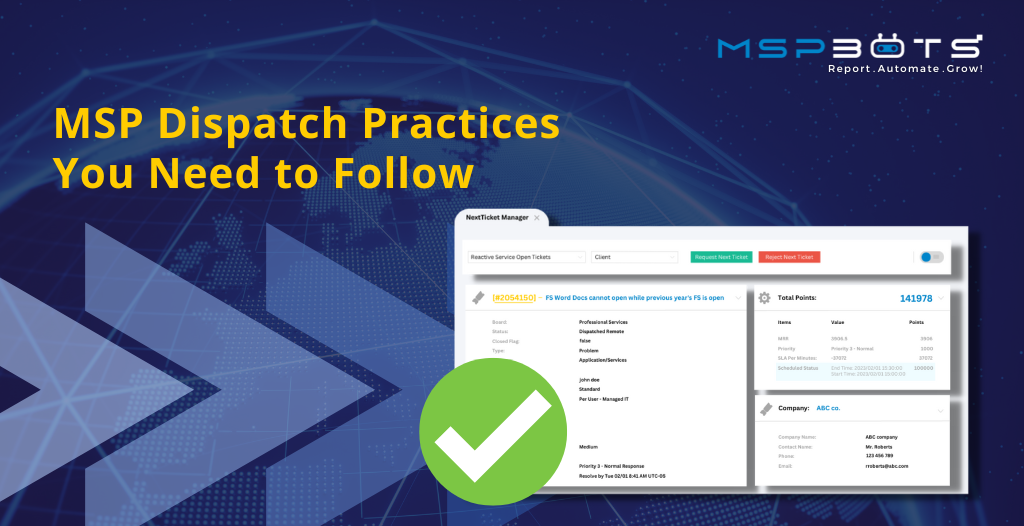MSP Dispatch Practices You Need to Follow
Keeping up with the demands of ticket management and daily processes in the MSP industry can be a challenging task. When we were building NextTicket Manager we asked ourselves: what do good dispatch practices for MSPs look like?
The truth is, inefficient ticket management can lead to delays in resolving client issues, while a lack of automation can result in repetitive tasks that waste valuable time. Poor time management can leave you struggling to balance competing priorities and struggling to meet client needs.
Whether you’re new to the MSP game or you’re a seasoned veteran looking for ways to improve your operations, we’ve got you covered. So, let’s get into it!
1. Implement a reliable system for ticket management
Ah, the pains of ticket management. We know all too well the headaches that can come with managing a sea of tickets in a limited timeframe. From prioritizing urgent issues to ensuring that nothing slips through the cracks, it takes a lot of effort to ensure the process goes swimmingly.
So, how can we navigate the tricky waters of ticket management and streamline our practices to stay afloat? One solution is to implement a system for categorizing and prioritizing tickets. By sorting tickets based on their urgency and impact on clients, you can ensure that your team is addressing the most critical issues first.
When deciding on your system don’t forget the power of automation! Automating certain aspects of ticket management, such as ticket routing and assignment, can save you valuable time and avoid errors that often occur with manual processes.
2. Establish prioritization criteria
Let’s face it: when we’re juggling multiple tickets and client requests at the same time, everything feels urgent. How do we prioritize our work and ensure that we’re addressing the most critical issues first?
We establish clear prioritization criteria. This can include factors such as the impact on the client’s business, the severity of the issue, and the level of urgency needed. Being able to define the criteria is helpful in translating your business’ values into your processes and ensures that your team is on the same page.
3. Create escalation paths and protocols
Sometimes, despite our best efforts, issues can arise that require more advanced technical expertise or vendor intervention. That’s where escalation comes in.
Therefore, you need to create clear escalation paths and protocols. This can include identifying which team members are responsible for handling escalated tickets and defining the criteria for escalation.
You also cannot emphasize the value of documentation enough.
When you document the steps taken during the escalation process and the resolution of escalated tickets, you can ensure the work is already completed. The valuable context it contains is being communicated from one level to the next and ensures that your team is learning from past experiences and continually improving their processes.
4. Put clear remote support procedures in place
Remote support has become increasingly important in the MSP world, especially in the wake of the pandemic.
Creating clear remote support procedures means defining the tools and technology that will be used and identifying the team members responsible for providing remote support to the clients.
Another helpful practice is to ensure that your team members have the necessary training and experience to provide remote support effectively. This includes providing training in remote support tools and technologies, as well as on effective communication and troubleshooting techniques.
How to achieve these best practices for your MSP
MSPbots NextTicket Manager is an automated ticket dispatch tool that uses a priority point system to streamline ticket assessment and assignment to technicians. This ensures that each ticket is the highest priority one at the time of assignment.
✅ The NextTicket Manager system allows you to categorize and identify priority tickets
✅ Fully automated
✅ Allows you to establish prioritization criteria with fully customizable settings
NextTicket Manager has even more capabilities for an improved ticket management process. Read: What is NextTicket Manager?
In addition to this supercharged app, MSPbots is a process automation platform that lets you integrate bots within your day-to-day and streamline or even remove repetitive tasks to help out with tedious processes.
Read: Process automation for MSPs
When a ticket requires escalation, escalation bots can be set to trigger at certain conditions. For example, the Idle Time Identifier bot sends notifications based on the following escalation levels:
- When a user has been idle, a prompt will advise user to change the status of the ticket they’re working on or update their attendance status.
- When a user hasn’t taken any action after the first prompt, a notification will be sent to the manager to remind their team member to perform a ticket or attendance update.
- When a user hasn’t taken any action after the second prompt, a notification will be sent to a higher-level manager.
In addition to helping out with escalation, bots can also function as enforcers of quality standards through micro-training. Especially with concerns in attendance, micro-training bots can help influence better habits.
Read: What is MSPbots Attendance Manager? The best attendance tracking software.
Bots like these…
✅ Create clear escalation paths and protocols
✅ Allow for better documentation
✅ Create clear remote support procedures
✅ Ensure that team members have the necessary training and experience
Promote the best MSP dispatch practices for your team starting today with MSPbots! Sign up for free or book a demo.


